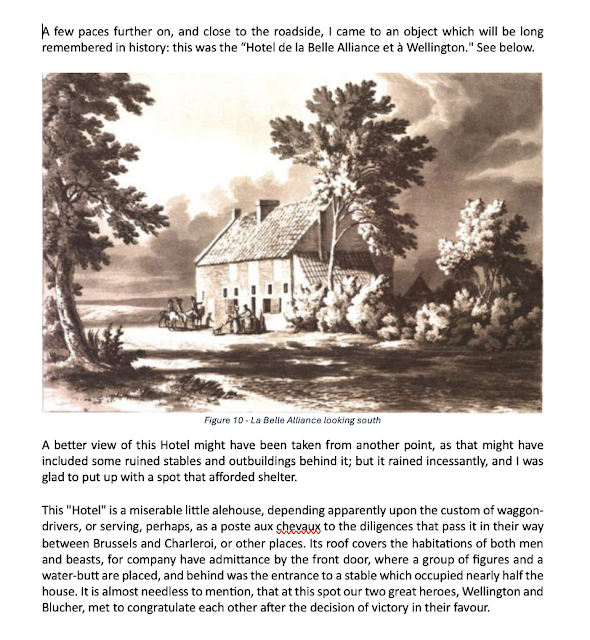Robert Hills (1769–1844) was a founder member of the Society of Painters in Water Colours. He visited the battlefield on 22 July 1815, and the following year produced "Sketches in Flanders and Holland: with some account of a tour through parts of those countries, shortly after the battle of Waterloo; in a series of letters to a friend" He described the book as ‘a faithful picture of the Low Countries, immediately subsequent to a most eventful period of their history’.
The fact that Hills visited the battlefield so soon after the 18th June and the fact that he drew with such careful attention to detail means that his pictures are particularly useful. Moreover, not only was a fine artist, he also supported his illustrations with some very careful descriptions that are especially useful to anyone studying the battle.
I have seen his images before but through the kind lead of 'Prince of Essling' on TMP I have been introduced to the supporting text.
This text has allowed me to understand the location of a small cottage. My father and I work on the buildings together - I do the research and he creates the models. When we first created La Belle Alliance and the building to its southwest, Trimotion, we could see an indistinct building at right angles to Trimotion and immediately to its front. These pictures show the arrangement:
By reading the Robert Hills text alongside his pictures it is now clear to me that the cottage he describes is in the same location as our attempt at a barn.











These last two posts show your dedication to detail and your determination to make the diorama as accurate as possible. When coupled with the quality and quality of the figures and amazing work-rate it produces marvellous 'fruits' of your posts that we all get to enjoy.
ReplyDeleteThank you and regards, James
(Not to mention information and inspiration for we wargamers to included in any representations on the table-top!)
DeleteVery interesting post, General P. The location of Hill's cottage is a bit of a puzzle. The sketch label clearly states that it is on west of the road, to the south of La Belle Alliance. However, pretty much everything else points to it being Decoster's own cottage, on the eastern side of the road, to the rear of La Belle Alliance. The external sketch appears to show the south-eastern corner of the cottage, with the chimney gable at the far end, providing the view straight up the Brussels road (through the displaced bricks shown in his internal sketch). The space alongside the right (east) of the cottage appears too narrow and overgrown to be the road, but is consistent with the shattered orchard he describes at the rear. Most tellingly, he speaks of looking west through the 'front, or roadside' rafters towards Hougoumont. Finally, the chimney in his sketch is consistent with a 1900 photograph of Decoster's cottage, with the Brussels-end chimney slightly offset right of the roof ridge (as viewed from the outside). What do you think?
ReplyDelete... although I note that Hill's cottage was 'at a very short distance' from La Belle Alliance, which would perhaps correlate better with Trimotion than Decosters, which was a few hundred yards further back.
Delete